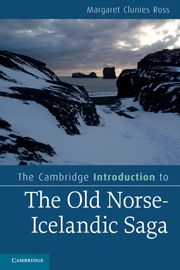Book contents
- Frontmatter
- Contents
- Tables
- A preface on practical issues
- Acknowledgements
- Abbreviations
- Chapter 1 Medieval Iceland
- Chapter 2 What is an Old Norse-Icelandic saga?
- Chapter 3 The genesis of the Icelandic saga
- Chapter 4 Saga chronology
- Chapter 5 Saga subjects and settings
- Chapter 6 Saga mode, style and point of view
- Chapter 7 Saga structures
- Chapter 8 The material record: how we know the sagas
- Chapter 9 Changing understandings of the sagas
- Notes
- Glossary of technical terms
- Guide to further reading
- References to volumes in the Íslenzk fornrit editions of Icelandic sagas
- Index
Chapter 9 - Changing understandings of the sagas
Published online by Cambridge University Press: 05 June 2012
- Frontmatter
- Contents
- Tables
- A preface on practical issues
- Acknowledgements
- Abbreviations
- Chapter 1 Medieval Iceland
- Chapter 2 What is an Old Norse-Icelandic saga?
- Chapter 3 The genesis of the Icelandic saga
- Chapter 4 Saga chronology
- Chapter 5 Saga subjects and settings
- Chapter 6 Saga mode, style and point of view
- Chapter 7 Saga structures
- Chapter 8 The material record: how we know the sagas
- Chapter 9 Changing understandings of the sagas
- Notes
- Glossary of technical terms
- Guide to further reading
- References to volumes in the Íslenzk fornrit editions of Icelandic sagas
- Index
Summary
The reception of sagas in post-medieval Iceland
In previous chapters we have touched from time to time both on the continuity of interest among Icelanders in their medieval sagas and on differences in taste for the various sub-genres that particular manuscript compilations and rates of manuscript copying reveal. The very large number of extant paper manuscripts of a good many sagas of different sub-genres indicates that they remained popular well beyond the Middle Ages in Iceland. When considering the post-medieval reception of saga literature in Iceland itself, it is necessary to make a distinction between the interests of educated Icelandic scholars and antiquarians and the more general popular interest among the farming community in the countryside. While many priests, lawmen and other intellectuals continued to study, copy and add to the corpus of Icelandic texts that had been composed during the Middle Ages, and from the mid eighteenth century to publish the first Icelandic editions of medieval sagas, popular interest was sustained mainly by sagas that were intended to be read aloud at the kvöldvaka (pl. kvöldvökur) or ‘evening wake’, the evening work period that took place on Icelandic farms during the winter months up to the end of the nineteenth century. A good many of the stories read at these gatherings were post-medieval compositions rather than versions of medieval sagas. Some were translations from Danish, German or Dutch chapbooks, but the majority were original Icelandic romances, to which the term lygisǫgur ‘lying sagas’ is often applied. These romances were the most popular sagas among the general Icelandic population until the end of the nineteenth century.
It is likely that the oral circulation of medieval saga stories, with or without written texts, was their principal means of dissemination in Iceland from the late Middle Ages onwards and that they were also read aloud for entertainment at the kvöldvökur, alongside other entertainments such as rímur. These latter were stanzaic narrative poems, often with romance subjects, that were a dominant form of entertainment in Iceland until the early twentieth century. The entertainment involving saga reading would have taken the form of an oral performance in which the reciter or reader is likely to have introduced variations to the text and comments of his own, often value-judgements on the saga characters themselves and their actions. Some saga manuscripts introduce such comments into the text and so indicate that the Icelandic audience often thought about the saga plot in black-and-white terms of heroes and villains.
- Type
- Chapter
- Information
- The Cambridge Introduction to the Old Norse-Icelandic Saga , pp. 153 - 163Publisher: Cambridge University PressPrint publication year: 2010



